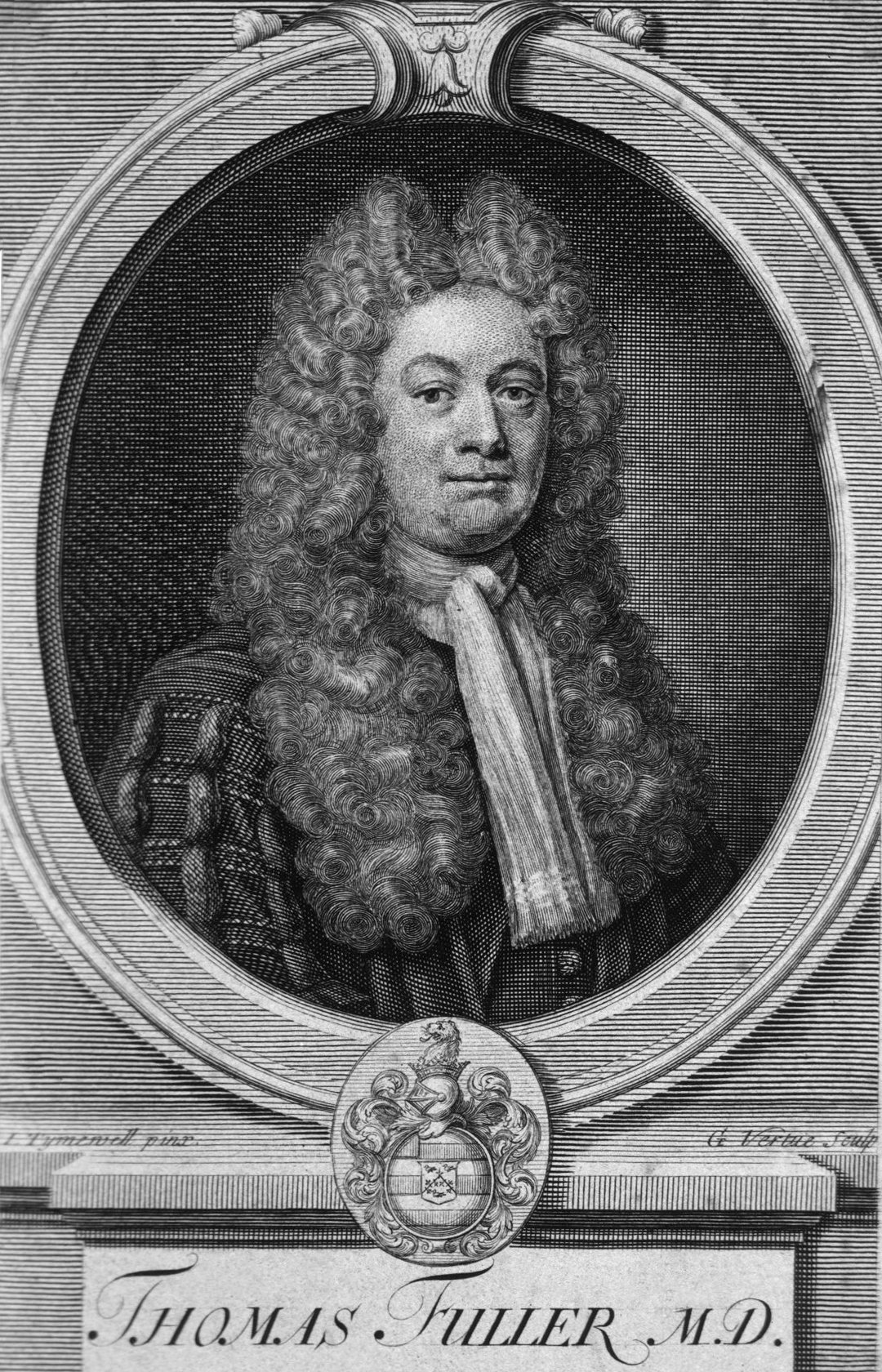“4084. Search not a Wound too deep, lest thou make a new one.”
Introductio ad prudentiam: Part II (1727), Gnomologia (1732)
Thomas Fuller, M.D. was a British physician, preacher and intellectual.
Fuller was born in Rosehill, Sussex, and educated at Queens' College, Cambridge. He practised medicine at Sevenoaks.
In 1723 he published Pharmacopoeia Domestica, and in 1730 Exanthematologia, Or, An Attempt to Give a Rational Account of Eruptive Fevers, Especially of the Measles and Small Pox. In 1732 he published a compilation of proverbs titled Gnomologia: Adagies and Proverbs; wise sentences and witty saying, ancient and modern, foreign and British which includes the words, "Be you never so high, the law is above you".
Wikipedia

“4084. Search not a Wound too deep, lest thou make a new one.”
Introductio ad prudentiam: Part II (1727), Gnomologia (1732)
“5241. To take from the right Hand, and give to the Left.”
Introductio ad prudentiam: Part II (1727), Gnomologia (1732)
“4776. The Sun is never the worse for shining on a Dunghill.”
Introductio ad prudentiam: Part II (1727), Gnomologia (1732)
“5184. To him, that you tell your Secret, you resign your Liberty.”
Compare Poor Richard's Almanack (1737) : To whom thy secret thou dost tell, to him thy freedom thou dost sell.
Introductio ad prudentiam: Part II (1727), Gnomologia (1732)
“5426. We are apt to believe what we wish for.”
Introductio ad prudentiam: Part II (1727), Gnomologia (1732)
“5779. Wise Men learn by other Men's Harms; Fools, by their own.”
Introductio ad prudentiam: Part II (1727), Gnomologia (1732)
“3779. One may say too much, even upon the best Subject.”
Compare Poor Richard's Almanack (1745) : You may talk too much on the best of subjects.
Introductio ad prudentiam: Part II (1727), Gnomologia (1732)
Variante: 300. A Man may say too much even upon the best of Subjects.
“2245. He that payeth beforehand, shall have his Work ill done.”
Introductio ad prudentiam: Part II (1727), Gnomologia (1732)
“6124. What cannot be cured,
Must be endured.”
Introductio ad prudentiam: Part II (1727), Gnomologia (1732)
“5115. 'Tis Self-Conceit, that makes Opinion obstinate.”
Introductio ad prudentiam: Part II (1727), Gnomologia (1732)
Introductio ad prudentiam: Part II (1727)
“5930. You lay on your Butter, as with a Trowel.”
Introductio ad prudentiam: Part II (1727), Gnomologia (1732)
“2018. He set my House afire, only to roast his Eggs.”
Compare Poor Richard's Almanack (1751) : Pray don't burn my House to roast your Eggs.
Introductio ad prudentiam: Part II (1727), Gnomologia (1732)
“849. Be as you would seem to be.”
Compare Poor Richard's Almanack (1744) : What you would seem to be, be really.
Introductio ad prudentiam: Part II (1727), Gnomologia (1732)
“2033. He talks in the Bear-Garden Tongue.”
Introductio ad prudentiam: Part II (1727), Gnomologia (1732)
“6318. Many a Little
Make a Mickle.”
Compare Poor Richard's Almanack (1737) : Every little makes a mickle.
Introductio ad prudentiam: Part II (1727), Gnomologia (1732)
Introductio ad prudentiam: Part II (1727)
“6172. Who so blind as he,
That will not see?”
Introductio ad prudentiam: Part II (1727), Gnomologia (1732)
“2420. He wrongs not an old Man, who steals his Supper from him.”
Compare Poor Richard's Almanack (1737) : He that steals the old man's supper, do's him no wrong.
Introductio ad prudentiam: Part II (1727), Gnomologia (1732)
“1048. Call your Husband Cuckold in Jest and he'll ne'er suspect you.”
Introductio ad prudentiam: Part II (1727), Gnomologia (1732)
“6401. The Love of a Woman, and a Bottle of Wine,
Are sweet for a Season; but last a short Time.”
Introductio ad prudentiam: Part II (1727), Gnomologia (1732)
“4874. There is a deal of Difference between Love and Gratefulness.”
Introductio ad prudentiam: Part II (1727), Gnomologia (1732)
“5085. 'Tis harder to unlearn than learn.”
Introductio ad prudentiam: Part II (1727), Gnomologia (1732)
Introductio ad prudentiam: Part II (1727), Gnomologia (1732)
“812. Argument seldom convinces any one contrary to his Inclinations.”
Introductio ad prudentiam: Part II (1727), Gnomologia (1732)